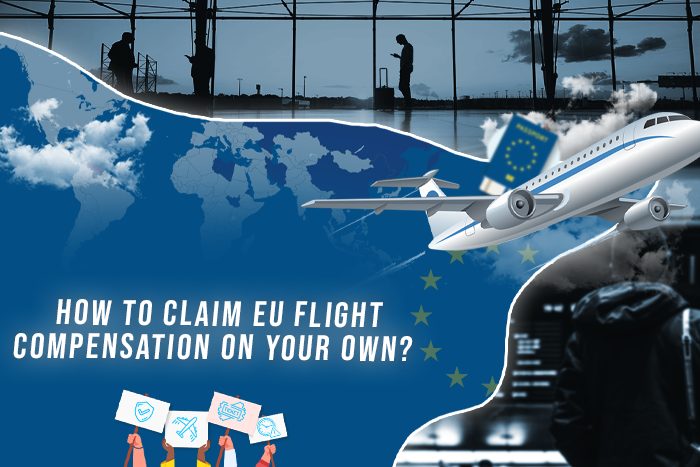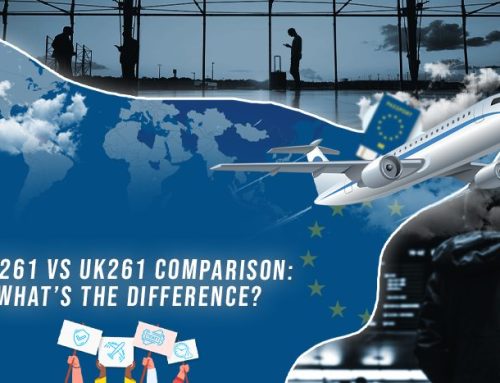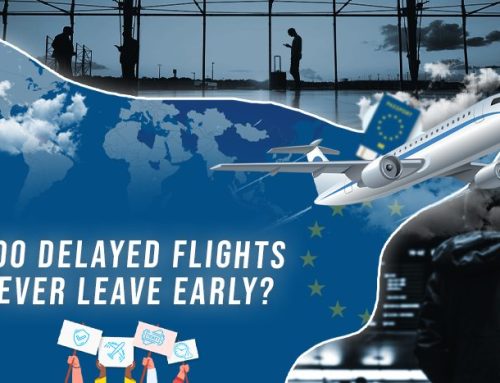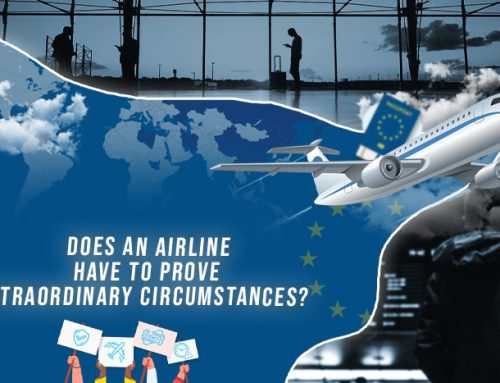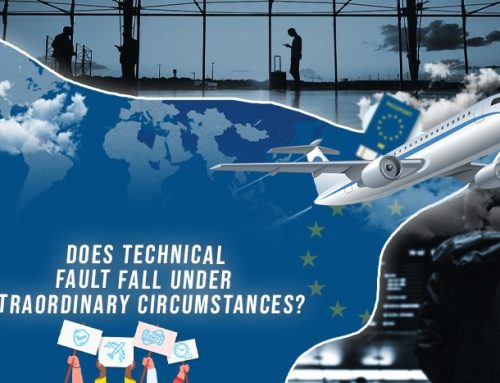You show up early for a flight only to look up at the board and find it is either cancelled or delayed. What now? Millions of air passengers face this exact dilemma every year. As a passenger, it can leave you feeling totally powerless. Luckily, you do have some rights when it comes to less than desirable flight outcomes. Thanks to EU Regulation 261/2004, you can claim an amount up to £540 for flights that have been delayed or cancelled. The best part of all, you don’t need a lawyer or outside help to claim EU flight compensation on your own. Below, we’ll outline how to claim compensation for a delayed or cancelled flight.
Statistics show that only 2% of air passengers that are eligible for compensation successfully claim that money annually. That means a staggering 98% of jilted passengers do not even attempt to claim. Know your passenger rights as laid out on EU 261 and get what is owed to you by an airline carrier.
Key Takeaways
- Passengers have the right to claim up to £540 in compensation for delayed or cancelled flights under EU Regulation 261/2004.
- When making a claim, it’s important to contact the airline that operated the flight, not the booking site, and provide a detailed description of what happened.
- If a claim is initially denied, passengers can escalate the issue to the National Enforcement Body or an Alternative Dispute Resolution party, and ultimately take their complaint to small claims court if necessary.
- It’s easier to claim compensation for a cancelled flight than a delayed flight, but regardless of the situation, it’s important to know and assert your passenger rights.
- Only 2% of eligible passengers successfully claim compensation annually, so it’s important to be persistent and thorough when making a claim.
How To Claim Compensation For A Delayed Flight
When a flight is delayed, it is still possible to take matters into your own hands. All you’ll need is a good deal of patience and an understanding of your passenger rights in regard to a delayed flight. While it won’t necessarily be a walk in the park, it is possible to get the compensation you deserve.
Let’s sort out the steps to claim EU flight compensation for a delayed flight.
#1. Reach Out To the Air Carrier Not The Middle Man
When claiming compensation for a delayed flight, it is important to reach out to the airline who operated the flight, not the company you booked with. For example, if you booked with a third-party booking site like Expedia, but the flight was operated by British Airways, your claim should be directed to British Airways.
Once you’ve sorted out who to contact, you’ll want to reach out in the appropriate manner. Many airlines will have you fill out an online form. Others may ask that you contact them by mail. However, the easiest and most effective way is to contact by email. You can find their email address on the “contact” or “support” section of their website.
#2. Lay Out The Details Of What Happened
However you choose to contact the airline, you will need to describe exactly what happened. Your letter/email/form should include the following:
- Fill out official EC261 claim compensation form
- Write a description of how your flight experience went wrong
- How much money you claim for your flight disruption
- Send it all to an airline
Strive to keep your cool and maintain positive communication. Don’t be boorish or contentious, as the person who will be subjected to your summary, is probably not the person who caused your issues.
After this step, you may receive a positive answer to your request for compensation. If that occurs, you’ve won! However, some will initially deny compensation, which will take you to step 3.
#3. Escalate Your Initial Claim
If you were initially denied compensation, you can escalate your claim to the National Enforcement Body or an Alternative Dispute Resolution party. It is not uncommon for air carriers to lie about the events at hand or take advantage of passengers’ insight into regulations. If you believe you deserve compensation under EU 261, take your claim to the CAA, a regulator body, or an adjudicator. Another option could be to contact flight compensation companies that would consult you on your case before escalating your claim further.
#4. Head To Small Claims Court
If the airlines refuse to pay compensation despite the decision of the National Enforcement Body or Alternative Dispute Resolution party, or the airline states that your claim is “being processed,” you do have a last resort option. You can take your complaint to small claims court. Of course, if this is the case, you may want to take legal advice or hire an attorney.
How To Claim Compensation For A Cancelled Flight?
When a flight is cancelled it can upend travel plans indefinitely. It may even alter certain aspects of your life. Much like claiming compensation on your own for a delayed flight, claiming compensation for a cancelled flight requires patience, time, and a solid understanding of your passenger rights under EU 261. Know, that in many cases, it is easier to ascertain compensation for a cancelled flight than a delayed flight.
Let’s break down the steps of claiming EU Flight compensation on your own.
#1. Address the Correct Airline or Involved Party
Much like as mentioned above with a delayed flight, you’re going to want to contact the airline directly. Do not contact the party you utilized to book your flight. For example, if you booked online with Air France but the carrier was Delta, you’ll want to contact Delta directly. The same goes if you booked with a third-party site such as Expedia. Contacting the wrong party involved will waste valuable time. In getting compensation, time is of the essence.
To contact the airline over a cancelled flight, email is typically the most valuable method of reaching out. Generally, you can find an email address on the support page of their main website. Calling is an option, but will often get you nowhere. Email allows you to thoughtfully detail what happened without the added pressure of another party on the line.
#2. Write Out Every Detail Of What Happened
The more detailed you are in your claim, the higher your odds of garnering compensation. Now is not the time to be vague or leave out important details. Simply forgetting something as pivotal as take-off time can lead to rejection. The content of your letter or email should include:
- Fill out official EC261 claim compensation form
- A detailed description of what happened: Which flight number was cancelled? How were you notified? How long until you were notified? Were you rerouted? If so, on what flight? How late did you arrive at your destination?
- How much money are you claiming in compensation for the cancelled flight
- Send it all to an airline
Following this point of contact, the airline may or may not grant you compensation. If they don’t, go on to step three.
#3. Contact the Appropriate Third Parties
If your claim has been denied, you can reach out to a National Enforcement Body or an Alternative Dispute Resolution Scheme. Some airlines will lie at all costs to deny you compensation. If you think they are not respecting your rights as laid out in EU 261, you can escalate your claim to the above-mentioned parties or a regulator. Depending on which country you call home, you may also be able to reach out to the national aviation authority to handle your flight compensation claims.
#4. Take Your Claim To Court
In general, this step should only be reached as a last resort. There will be fees necessary to submit your claims and you will likely have to consider seeking legal help. Some courts will also require you to make an in-person appearance.
Know Your Rights As A Passenger

Under EU 261, airline passengers do have a right to compensation, reimbursement, or rerouting depending on the situation at hand. In addition to the refund of your ticket or the alternate flight, you might be entitled to flight cancellation compensation, as long as a few key conditions are met. The conditions are as follows:
- Did the airline notify you of the cancellation? If so, when?
- Did they provide an alternative flight? If so, when was it to depart and arrive?
If the carrier notified you of the cancellation 14 days prior to the flight, you are not entitled to compensation. If they notified you within 14 days of the flight, it depends on the terms of the alternate flight offered.
If the airline failed to notify you about the cancellation until you arrived at the airport, the same rules apply as if they had warned you 7 days prior to the flight or less.
Additionally, if the airline notified you within 14 days before departure but did not provide an alternate flight option, you are entitled to compensation.
Frequently Asked Questions
-
What is EU flight compensation?
EU flight compensation is a monetary amount that can be claimed by passengers for flights that were delayed, cancelled or overbooked by an EU airline.
-
Am I eligible to claim EU flight compensation?
You may be eligible to claim compensation if your flight meets certain criteria such as the airline being EU-based, the flight is delayed for more than 3 hours, or be cancelled without prior notice.
-
How much compensation can I claim?
The amount of compensation varies based on the distance of the flight, the duration of the delay, and the circumstances of the cancellation or overbooking. It can range from £230 to £540.
-
Can I claim compensation if the delay was due to bad weather?
If the delay was caused by extraordinary circumstances, such as bad weather or strikes, you might not be eligible for compensation.
-
Can I claim compensation if I missed my connecting flight?
If the connecting flight was on the same booking and the airline caused the delay, you may be eligible for compensation.
-
How do I claim EU flight compensation?
You can claim directly with the airline or use a third-party service. You will need to provide evidence of your booking and details of the delay or cancellation.
